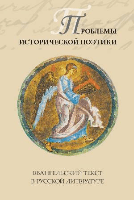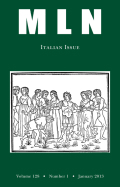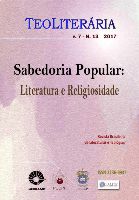
Problemy Istoricheskoi Poetiki
Scope & Guideline
Advancing the Dialogue on Historical Poetics
Introduction
Aims and Scopes
- Historical Poetics:
The journal examines literary works within their historical contexts, allowing for a deeper understanding of the evolution of themes, genres, and styles in Russian literature. - Intertextuality and Adaptation:
It explores how texts reference and adapt other literary works, shedding light on the ongoing dialogues between authors and their predecessors or contemporaries. - Religious and Philosophical Themes:
A significant focus is placed on the interplay between literature and religious thought, particularly Christian motifs, and their impact on narrative and character development. - Genre Studies:
The journal delves into the characteristics and transformations of various literary genres, including poetry, prose, and folk traditions, highlighting their role in shaping cultural narratives. - Cultural and National Identity:
There is an emphasis on how literature reflects and shapes Russian cultural and national identity, particularly in response to historical events and social changes. - Theoretical Approaches:
It engages with different theoretical frameworks, including phenomenology, semiotics, and narratology, to analyze the poetics of literary texts comprehensively.
Trending and Emerging
- Christian Symbolism and Theology:
There is an increasing focus on Christian themes and symbols in literature, reflecting a broader interest in how religious narratives shape literary forms and character development. - Chronotope and Space-Time Analysis:
Scholars are increasingly applying Bakhtinian concepts of chronotope to study how time and space are represented in literary texts, revealing deeper connections between narrative structure and historical context. - Cultural Memory and Identity:
Recent works emphasize the role of literature in constructing cultural memory and identity, particularly in relation to historical trauma and national narratives. - Gender Studies and Representation:
An emerging interest in gender dynamics within literary texts is evident, exploring how female characters are portrayed and how gender influences narrative structure and themes. - Ecocriticism and Nature Imagery:
There is a growing trend towards examining ecological themes and nature imagery in literature, reflecting contemporary concerns about the environment and humanity's relationship with nature.
Declining or Waning
- Focus on Non-Russian Literature:
There has been a noticeable decline in studies that focus on non-Russian literary works or comparisons, as the journal increasingly prioritizes Russian literature and its specific contexts. - Historical Biographies:
The exploration of biographical narratives related to authors has diminished, suggesting a shift towards more thematic and analytical approaches rather than biographical analyses. - Folklore Studies:
While folklore has been a significant area of interest, its representation in recent publications has waned, possibly due to a growing focus on modern literary forms and theoretical interpretations. - Psychological Criticism:
The psychological analysis of characters and narratives, which was once a prominent theme, has seen a decrease, indicating a shift towards historical and cultural contexts instead. - Rhetorical Analysis:
The examination of rhetorical strategies in texts has become less frequent, as the journal's contributors seem to favor broader thematic and philosophical discussions.
Similar Journals

MLN
Illuminating the Rich Tapestry of Language StudiesMLN, published by Johns Hopkins University Press, is a leading academic journal that spans the fields of Linguistics, Literature, and Literary Theory. Serving as a crucial platform for scholarly discourse, MLN has established itself with a substantial impact factor and a dedicated readership, particularly recognized in its category quartiles—ranking Q3 in Linguistics and Language, and Q2 in Literature and Literary Theory as of 2023. The journal provides a vital venue for innovative research and discussions that push the boundaries of language studies and literary analysis, fostering an engaged community among researchers, students, and professionals. Although not open access, MLN maintains its commitment to academic rigor and accessibility in the United States from its base in Baltimore, Maryland, offering valuable insights and significant contributions from converged years spanning 2002 to 2024. With a competitive standing in Scopus rankings, it continues to be an essential resource for those looking to deepen their understanding of the dynamic intersections between language and literature.

POETICA-ZEITSCHRIFT FUR SPRACH-UND LITERATURWISSENSCHAFT
Exploring the Depths of Language and LiteraturePOETICA-ZEITSCHRIFT FUR SPRACH-UND LITERATURWISSENSCHAFT is a pivotal journal published by Brill, focusing on the fields of linguistics and literary studies. Founded in Germany, this esteemed publication showcases rigorous scholarly research, fostering a deeper understanding of language and literature. Although the journal does not currently operate as an open-access platform, it remains an essential resource for academics in these areas, featuring innovative studies that span from 2002, through selected years, to 2024. With a Q4 category in Linguistics and Language and a Q3 in Literature and Literary Theory as of 2023, POETICA ranks among the significant contributors to the arts and humanities discourse. It provides a vital forum for researchers and students to engage with contemporary debates and methodologies, ensuring its relevance and importance in the academic community.

Romanic Review
Exploring the Depths of Romance Languages and LiteratureThe Romanic Review, published by Duke University Press, stands as a significant scholarly platform in the field of Romance languages and literature. With its ISSN 0035-8118 and E-ISSN 2688-5220, this journal has been serving the academic community since its inception and will continue its contribution until 2024. Situated in the United States, it has carved out a vital niche in the Arts and Humanities, currently falling within the Q3 quartile as per the 2023 rankings. Although it operates under a traditional subscription model, its focus on disseminating critical and innovative research makes it an indispensable resource for scholars and students alike. The Romanic Review is dedicated to fostering academic discussions that bridge interdisciplinary gaps, making it a cornerstone reference for anyone engaged in the study of Romance cultures, linguistics, and literary studies.

CHILDRENS LITERATURE IN EDUCATION
Connecting Literature and Learning for Future GenerationsChildren's Literature in Education is a prestigious journal published by Springer, dedicated to the critical exploration and scholarly analysis of children's literature within educational contexts. Established in 1970 and continuing to present, this journal serves as a prominent platform for researchers, educators, and literary scholars to disseminate their findings and engage with innovative ideas. With significant rankings in multiple categories—Q3 in Education, Q2 in Linguistics and Language, and Q1 in Literature and Literary Theory—the journal holds a distinguished position within the academic landscape. Notably, its Scopus rankings illustrate its impact, particularly in the arts and humanities, where it ranks 32nd out of 1106 journals. While it does not currently offer open access, Children's Literature in Education remains an invaluable resource for anyone interested in understanding the intersection of literature and pedagogy. For scholars aiming to expand their knowledge and contribute to the discourse surrounding children's literature, this journal provides a rich repository of research that is both relevant and compelling.

Teoliteraria-Revista Brasileira de Literaturas e Teologias
Fostering Dialogue Between Texts and TheologyTeoliteraria-Revista Brasileira de Literaturas e Teologias is a distinguished open-access journal published by the Pontifícia Universidade Católica de São Paulo (PUC-SP), dedicated to the interdisciplinary exploration of literature and theology. Since its establishment in 2011, this journal has been pivotal in fostering dialogue between literary studies and theological discourse, offering scholars a platform for innovative research and thought-provoking articles. With its ISSN 2236-9937, Teoliteraria prides itself on promoting academic rigor and diversity in scholarship, making it an indispensable resource for researchers, professionals, and students pursuing insights at the intersection of these rich fields. Located in São Paulo, Brazil, the journal is easily accessible to a global audience, underscoring its commitment to knowledge dissemination and scholarly collaboration.

COLOQUIO-LETRAS
Exploring the Depths of Literary InnovationCOLOQUIO-LETRAS is a distinguished literary journal published by the Fundação Calouste Gulbenkian in Portugal, dedicated to the exploration and analysis of innovative and critical perspectives in literature and literary theory. With an ISSN of 0010-1451, this journal occupies a notable position in the academic landscape, as evidenced by its Q4 ranking in the 2023 category of Literature and Literary Theory, and a Scopus rank of 1051/1106, placing it within the 5th percentile. Despite being a relatively niche publication, COLOQUIO-LETRAS plays a critical role in fostering scholarly dialogue and advancing theoretical frameworks within the field. The journal publishes articles, essays, and reviews that contribute to the rich tapestry of literary discourse, making it a valuable resource for researchers, educators, and students alike. Given its commitment to reflecting the complexities of literature from various cultural and theoretical dimensions, COLOQUIO-LETRAS is poised to inspire and inform its readership through its convergence of ideas from 2009 to 2017 and continuing through 2019 to 2024.

Novyi Filologicheskii Vestnik-New Philological Bulletin
Engaging Minds in the Evolution of PhilologyNovyi Filologicheskii Vestnik-New Philological Bulletin is a distinguished academic journal published by the Russian State University for the Humanities, devoted to the interdisciplinary study of linguistics, literature, and philology. With its ISSN 2072-9316, this journal serves as an essential platform for scholars, researchers, and students aiming to explore the depths of philological research and its applications. Although currently operating under a traditional access model, the journal emphasizes accessibility and engagement with advancements in linguistic theory and literary analysis, reflecting the evolving landscape of philological studies. The bulletin is dedicated to fostering academic discourse by publishing original research, critical essays, and comprehensive reviews, thereby contributing significantly to the advancement of knowledge and understanding in the field. Set in the heart of Moscow, the journal aims to bridge local and global scholarship, inviting contributions that showcase innovative methodologies and theoretical frameworks. Overall, Novyi Filologicheskii Vestnik-New Philological Bulletin stands as a vital resource for anyone interested in contemporary developments in philology and related disciplines.

F Scott Fitzgerald Review
Delving into the Soul of the Jazz AgeThe F Scott Fitzgerald Review is a distinguished journal published by Penn State University Press, dedicated to the critical examination and appreciation of the works of F. Scott Fitzgerald and their lasting impact on literature and culture. With an ISSN of 1543-3951 and an E-ISSN of 1755-6333, this journal publishes an array of scholarly articles, essays, and reviews that explore themes, styles, and the historical context of Fitzgerald's writings. Since its inception in 2017, it has established itself as a vital resource in the field of Literature and Literary Theory, achieving a Scopus ranking of #336 out of 1106, placing it in the 69th percentile of its category. While currently not an open access journal, it remains an essential medium for researchers, professionals, and students interested in enriching their understanding of Fitzgerald's literary contributions. The journal's commitment to rigorous scholarship and insightful analysis makes it a significant platform for ongoing discussions about one of America's literary giants.

ANQ-A QUARTERLY JOURNAL OF SHORT ARTICLES NOTES AND REVIEWS
Advancing the Discourse in Cultural Studies and HistoryANQ: A Quarterly Journal of Short Articles, Notes and Reviews is a distinguished publication hosted by Routledge Journals, Taylor & Francis Ltd, and plays a pivotal role in the fields of Cultural Studies, History, and Literature and Literary Theory. Since its inception in 1988, the journal has fostered a dynamic exchange of ideas, featuring concise articles that provide insightful analyses, reviews, and commentary on contemporary issues and historical perspectives, making it an invaluable resource for scholars and practitioners alike. With an impressive ranking within the 89th percentile in Literature and Literary Theory and consistently recognized in the Q2 and Q3 quartiles across key categories, ANQ stands as a testament to rigorous scholarship and innovation in research. While the journal operates under a traditional subscription model, its contributions significantly enrich the academic conversation, fostering insights that resonate across disciplines. Located in Milton Park, Abingdon, United Kingdom, ANQ invites researchers, professionals, and students to delve into its treasure trove of short articles and reviews, thereby enhancing their understanding and appreciation of cultural narratives and literary discourse.

Impossibilia-Revista Internacional de Estudios Literarios
Fostering Global Dialogues Through LiteratureImpossibilia-Revista Internacional de Estudios Literarios is a premier open access journal dedicated to the vibrant field of literary studies, published by ASSOC CULTURAL IMPOSSIBILIA since 2011. With its ISSN 2174-2464, this international journal encourages the exploration and analysis of diverse literary theories, texts, and contexts, making it an essential resource for researchers, scholars, and students alike. Hailing from Granada, Spain, Impossibilia not only fosters academic discourse in literature but also promotes intercultural dialogue through its commitment to accessibility and inclusivity. While data such as H-index and Scopus rankings are still to be developed, the journal's focus on enriching the literary landscape ensures its growing impact and relevance within the academic community.